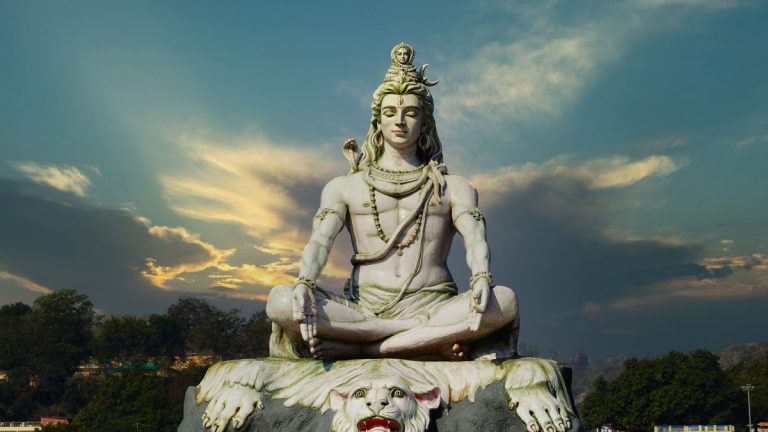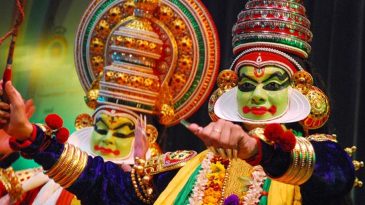- Festivals
- Updated on July 13, 2023
Importance of Shrawan Month in Hindu Religion

Shravan, also known as Swaan or Shravana Mas, is revered as a holy month in the Hindu calendar. Lord Shiva, one of the most important deities in Hinduism, is honoured throughout this month, the fifth of the Hindu lunar calendar. To gain Lord Shiva’s favour and strengthen their spiritual bond, worshippers partake in several religious observances during this month of auspiciousness.
For Hindus throughout India, the month of Shravan is a time of increased devotion, fasting, and religious observances due to its promising importance. Legends and tales from Hindu mythology are linked to this month, and they all centre on the heavenly presence of Lord Shiva and his beneficent interactions with his worshippers. This month’s telling of such stories helps set a more religious tone, encouraging believers to deepen their devotion and pray for divine favour.
Regular offerings of milk, water, and Bilva leaves, as well as visits to Shiva temples and abhisheka, the ceremonial bathing of the Shiva Linga, are performed by devotees. Many devout people make Mondays, or “Shravan Somvar,” a day of fasting as a sign of respect and dedication. These religious practices are said to appease Lord Shiva, who bestows upon devotees material and spiritual benefits.
What is special about Shravan 2023
The Hindu month of Shravan Mahino, usually known simply as Shravan, is a time of great importance. Shravan Mahino 2023 is scheduled to run from July 24th to August 22nd. It’s a time for worshippers to pray to Lord Shiva and offer praise.
However, owing to the lunar calendar’s mismatch with the solar calendar, an extra month known as “Adhik Maas” or “Adikmas” appears in specific years. According to Hindu beliefs, the month of Adikmas is unlucky and should be avoided at all costs.
The fact that there are eight Mondays in the month of Shravan is viewed favorably and gives the celebrations more meaning. In this holy month, devotees think that each Monday spent honoring Lord Shiva would bring great spiritual rewards.
Eight Mondays allow believers to increase their devotion via prayer and fasting. Early risers often begin their day with a ceremonial bath, followed by prayers to Lord Shiva. They pay a visit to Shiva temples, where they bathe the Shiva Linga and present religious things like flowers and fruit.
Why it is celebrated shravan Somwar
Mondays of the Hindu calendar month of Shravan, or Shravan Somwar, are noteworthy and observed by devout Hindus throughout India. The worship of Shiva, whose birth month is Shravan, lies at the heart of this custom. The following are some of the main reasons why Shravan Somwar is observed:
- Lord Shiva’s Blessings
In Hinduism, Lord Shiva is worshiped as the primary god responsible for destruction and rebirth. On Mondays throughout Shravan, devotees fast and pray to appease Lord Shiva and receive his favor. People believe in this practice because they think it will lead to success in life and personal development.
- Repentance and Cleansing
People fast on Shravan Somwar as a means of self-improvement and atonement. Devotees fast to cleanse their bodies, minds, and spirits while asking for pardon for their misdeeds. People think fasting during this period might help them purge bad energy and reach a higher spiritual plane.
- Seeking Boons and Fulfilling Desires
Shravan Somwar is celebrated by devotees so that they may pray to Lord Shiva for help. Devotees hope to gain Lord Shiva’s favor, protection, and direction by honoring him on Mondays. They pray earnestly, laying forth their needs and asking for help from above.
- Strengthening Your Faith and Bond with God
The festival of Shravan Somwar is a time for worshippers to increase their faith in and devotion to Lord Shiva. Devotees may deepen their spiritual practices and feel a greater connection with the divine by devoting a particular day of the week to rigorous prayer, fasting, and meditation.
- Community Celebrations
In addition to private observance, Shravan Somwar is also commemorated socially. People gather at Shiva temples to worship the god in a communal setting, participating in processions and singing Shiva hymns and prayers together. An atmosphere of togetherness, commitment, and shared spiritual experiences is created via this community celebration.
- Interpretation of Symbols
Mondays are considered particularly lucky since they are worship days for Lord Shiva. Since Lord Shiva is worshiped throughout the month of Shravan, it is essential to fast and pray on Mondays. The spiritual significance of these rituals is said to be amplified when performed on a Monday during the month of Shravan.
Why do people avoid onion and garlic in Shravan
Many Hindus abstain from eating onion and garlic throughout the month of Shravan as part of their religious observances. Many believers maintain this custom because they believe it aligns with their religious or cultural values. Onion and garlic are often avoided during the month of Shravan for several reasons.
- Satvik Diet
Many believers follow a satvik diet throughout the month of Shravan because of its spiritual significance. People who eat satvik cuisine feel it will help them focus on their spirituality. However, rajasic foods like onions and garlic are related to heightened passion, violence, and lower spiritual vibrations. People avoid these substances to keep their minds at ease and their relationships harmonious.
- Cleansing and Detoxification
The month of Shravan is associated with the physical and spiritual cleansing of the self. Many Hindus consider onions and garlic rajasic because they excite the senses and fuel the appetite. By eliminating these foods, devotees want to cleanse their bodies and clear their thoughts so they may concentrate on their devotional activities.
- Ayurvedic Considerations
Onion and garlic, according to Ayurveda, the ancient Indian medical system, might make you feel hotter and more acidic. It is widely held that the human body is more vulnerable to imbalances and diseases during the monsoon season when Shravan occurs. According to Ayurvedic principles, avoiding onion and garlic helps keep the body balanced and healthy.
- Customs and social mores
Many Hindu groups have adopted a centuries-old tradition of avoiding onion and garlic during Shravan. It’s a chance to honor the past and keep the rules handed down from generation to generation throughout this joyous month.
- Interpretation of Symbols
Root veggies like onions and garlic represent our baser tendencies and insatiable need for material things. Devotees try to rise beyond the material world and concentrate on spiritual matters by avoiding these substances.
It’s worth noting that not all Hindus observe the custom of not eating onion or garlic during Shravan. Some people may be prohibited from eating certain foods because of their religious or cultural beliefs or practices.
What to eat if you are fasting
To keep the fast pure and in harmony with spiritual practices, it is usual for devotees to adhere to specific food requirements during puja and ceremonies. When fasting for puja and rituals, these are some of the most typical foods eaten:
- Fruits
Fruits are often eaten during fasts because of their association with purity and lightness. Fruits, including bananas, apples, oranges, pomegranates, and grapes, are staples in the diets of many believers. Smoothies and liquids made from these fruits are very delicious.
- Products Derived From Milk
Milk is a precious and vital dietary source. During the fast, many devotees enjoy dairy products, including milk, yogurt, buttermilk, and paneer (cottage cheese). These dairy products help keep you nourished and energized.
- Nuts and Dry Fruits
Nutritious and filling dry fruits and nuts are an excellent choice for fasting. In addition to pistachios, almonds, cashews, raisins, dates, and safflower seeds are also popular. You may drink them or incorporate them into other recipes, such as kheer .
- Tapioca pearls, or sabudana
Sabudana is a staple of Hindu festival feasts and is eaten by those who are fasting. Sabudana is mainly used in the preparation of sabudana khichdi and sabudana vada . Sabudana is an excellent source of carbs and is very digestible.
- Flour made from Singhara
Singhare ke atte ki puri (fried bread made with water chestnut flour) and Singhara flour halwa are common fasting-friendly dishes prepared using Singhara flour. Gluten-free Singhara flour is a great source of carbs before, during, and after a fast.
- Salt Rock
During a fast, you should stay away from regular table salt. Devotees, conversely, season their meals with rock salt . It doesn’t contain any iodine, thus it’s safe to consume.
It’s worth noting that fasting diets may vary widely according to factors including regional tradition, individual taste, and special nutritional needs. Fasting for puja and ceremonies requires careful planning, so it’s best to seek advice from elders, religious authorities, or family traditions about what to eat.
FAQ
What to do and what not to do ?
- Fast on Shiva-dedicated Mondays
- Pray to Shiva for blessings
- Attend Shiva temple festivities and processions.
- Meditate, recite mantras, and study Shiva-related writings.
- Help others.
- Cleanse ideas, behaviors, and environment.
- Avoid non-vegetarian food, alcohol, and smoking during Shravan.
- Avoid bad behavior.
- Avoid cutting hair or nails this month.
- Black garments are unlucky.
How sati and shiv are linked with this month?
Shravan connects Lord Shiva with Sati, his spouse. In Hindu legend, Sati self-immolated at her father Daksha’s epic sacrifice. Lord Shiva, enraged, took her flaming corpse and performed the Tandava, a cosmic dance of devastation.Lord Shiva meditated with Sati’s ashes in Shravan. Lord Shiva mourned and penanced throughout this era. This month, devotees fast, do rituals, and pray to commemorate Lord Shiva’s anguish and ask for strength, purification, and spiritual progress.
Join the discussion
Related Articles
No results available
ResetTrending Articles


- Health
- Updated on July 16, 2025


- General
- Updated on July 16, 2025


- General
- Updated on July 14, 2025


- General
- Updated on July 12, 2025


- General
- Updated on July 12, 2025


- General
- Updated on July 8, 2025


- General
- Updated on July 7, 2025


- General
- Updated on July 8, 2025


- General
- Updated on July 4, 2025


- General
- Updated on July 2, 2025
No results available
Reset


